Problem vs solution oriented

Is my bog too problem vs solution focused?
Yes, I’m paranoid.
This week I shared some really heavy posts / emails about a couple of topics impacting special needs families in the United Kingdom —
1. Demolishing special ed. support systems (up for a vote in Parliament to slash funding for Education, Health and Care Plans (EHCP)) and
2. Persecution of moms who don’t stop asking for help with diagnosis after doctors say there’s no problem.
It got me wondering how to share more hopeful, uplifting posts from the sea of trauma, grief, and struggle that is my topic (children with a catastrophic medical diagnosis).
The main objectives for my mission are to:
1. Increase public awareness so more not less services are created and sustained for these families.
2. Help families themselves have more hope and sense of control to navigate a life no one’s prepared for and one inadequately supported by society.
Now today a psychotherapist I follow on Instagram addressed a follower’s compl
...Who will care for our disabled loved one once we’re gone?
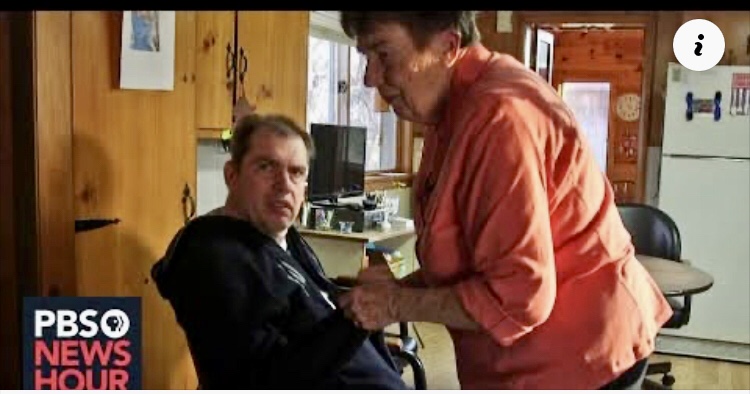
Here’s a thought provoking PBS video about caregivers and their adult children or siblings with disabilities.
Who will care for our loved one once we’re gone? is the perpetual terror gnawing at them from the moment the diagonals is understood.
None escape this torment.
—.—
Hundreds of thousands of people with intellectual and developmental disabilities in America are living and receiving care at home.
But their aging caregivers, many of whom are parents or siblings, are worried about who will continue to care for their loved ones when they are gone.
Christopher Booker reports on some steps being taken to support families as part of our series, ‘Rethinking Lifespan.’
Is FII a modern witch-hunt?

A colleague I’ve witnessed struggle for a few years shared the below Facebook post (sorry I can only figure out how to give link to post page, not actual post…)
She’s been on an exhausting and scary journey because professionals haven’t figured out what’s going on with her young daughter.
This means that basic needs, such as adaptations at school, have not yet been met.
AND she’s up against a new practice interfacing with anxious mothers like her—questionable and concerning professional behavior in the fields of medicine, education, and child protective services.
The mental health condition—Münchausen syndrome—also known as factitious disorder where a person imagines health problems, has been expanded and is being used, without academic or professional validation.
Some consider this expansion as an unethical, unhelpful, and even dangerous practice.
- The new (non)diagnosis is called Fabricated or Induced Illness (FII).
And parents are even losing custody of their children base...
The strength to overcome

What have you overcome that you previously thought you couldn’t?
What tools, memories, or beliefs made that possible?
Where can you apply that more in your life right now?
—.—
I made it through college, one term paper at a time, remembering that I made it over Millys Foot Pass.
Up that EXTREMELY steep, gravely mountain range.
In freezing weather.
Without a trail.
Carrying my own heavy backpack.
….
Whenever I had NO idea what to write in college but deadlines were imminent, I reminded myself of two things.
1. There’s no going back, only forward.
2. If I could accomplish that physically demanding feat I could sure as heck put words on a piece of paper.
What dormant personal agency from the past can YOU activate and leverage now?
—Julie
What is the generational price many veterans pay for their service?

In honor of veterans, here’s an incomplete exposé of the price of war on their children, in particular, major medical and psychological impacts.
These issues stem from factors associated with military life and deployment:
1. Indirect exposure to trauma.
2. Stress.
3. Environmental.
This in no way implies that a parent with physical or psychological challenges inherently cause children harm because of their own conditions.
It’s meant to connect dots and raise awareness of outcomes beyond the veteran themself.
It helps us:
- respond to underacknowledged post service needs,
- more accurately calculate the true cost of war,
- better allocate support resources for military families.
This cursory glance shows what children in families of some military veterans navigate:
— Attachment and relational needscan be disrupted. Attachment patterns, established in the first years of life, unconsciously impact the quality of relationships thereafter.
— Prenatal exposure to toxins (even in a...
What’s life coaching do for people?

As a life coach my job isn’t to find solutions for clients.
That’s the job of a consultant.
It’s not to fix people either.
People who are struggling aren’t broken, they’re just discombobulated.
What helps my clients move forward is guidance.
I help define and frame their problems in a way that explains them and reduces pain, just because the problem is correctly framed.
From that structure THEY come up with solutions.
Because what I might do or Betty might do isn’t necessarily going to work for them, at least not right then.
Here are a few other things that happen in our coaching program:
— By setting aside consistent, dedicated time to address their problems, clients are more proactive.
— This helps minimize the impact of current problems while sometimes preventing others from popping up.
— Clients get concerns off their chest in a confidential setting. Too often, people keep things bottled up for fear of negative judgment or unsolicited (and unhelpful and unwanted) advic...
You’re paying a price … but for what?
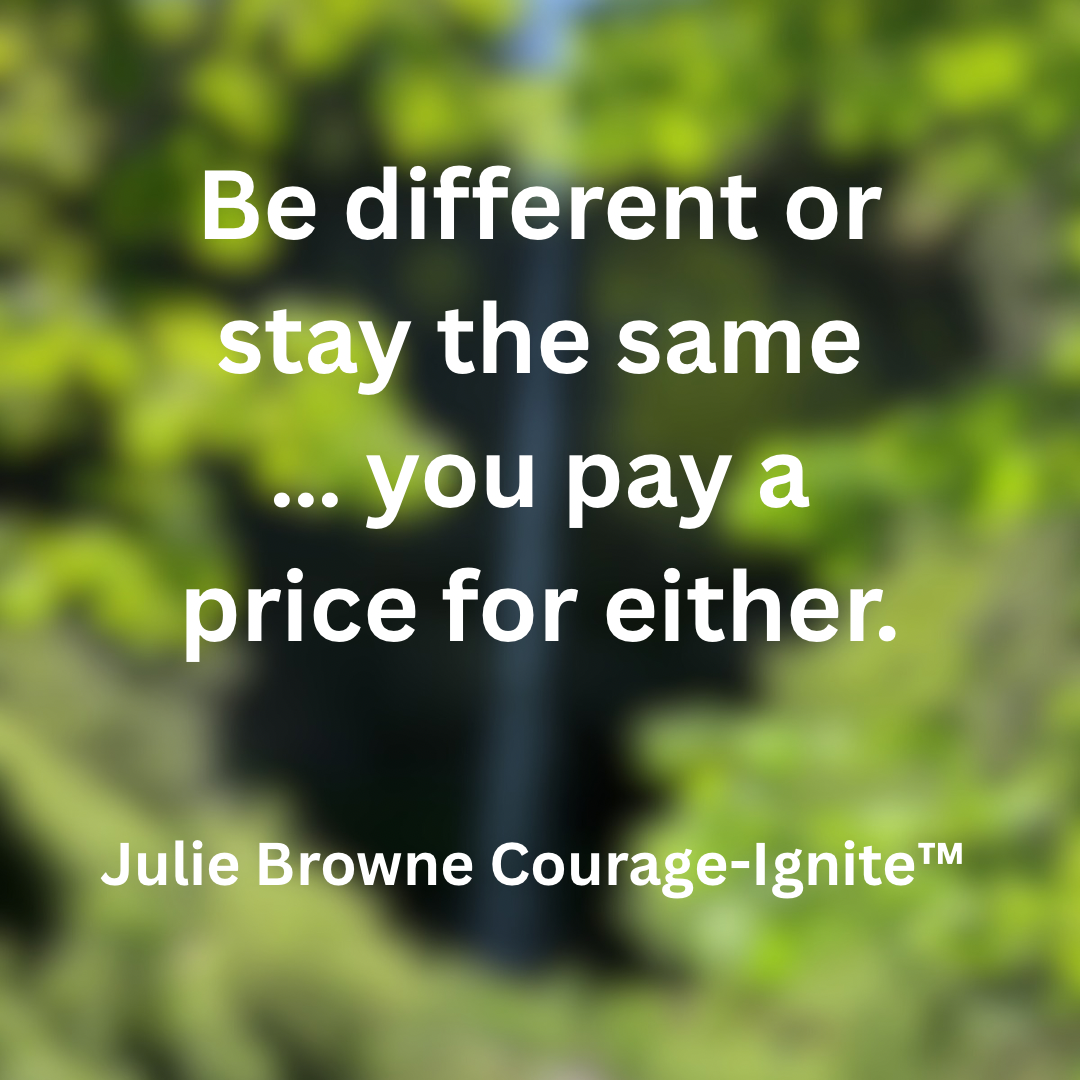
In the big picture of things, nonconformity is discouraged while groupthink is encouraged, expected, and rewarded.
It’s where the comfort zone is.
It also, by definition,
— reduces options,
— stunts innovation and growth,
— sustains mediocrity and excludes excellence.
Whether you’re in a forced or chosen change, those around you want stabilization so they can have predictability again.
It’s also what you want.
But this Big Temptation—the fastest path to stabilization—causes many to commit prematurely. To settle.
Ending up with mediocrity and frustration instead of wonderful things you’d never imagined.
- To have a better life it takes courage to risk embarrassment, rejection, retribution, and even expulsion from groups where you belong.
To break away from groupthink.
To make waves.
To go against the current of status quo.
Even when status quo purports to be “best practices.”
Even when tradition has “proved itself with the test of time.”
Because best practices and tr...
Which camp are you in?
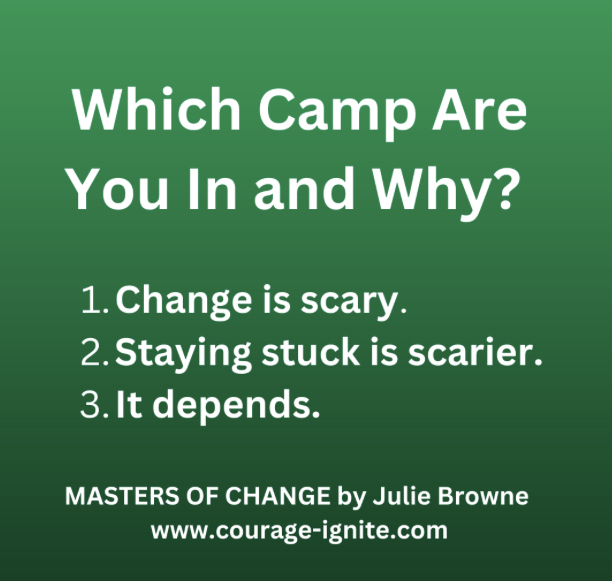
Most people think change is complicated.
I believe that when we let go of resistance to change we become comfortable being UNcomfortable.
Comfortable being…
Disoriented.
Confused.
Scared.
Even comfortable being in pain.
And when we become comfortable being uncomfortable we stop feeling lost because of it.
We stop feeling defeated because of it.
And we improve how we experience change.
We can make a mindset shift to ALLOW ourselves to be comfortable with pain,
with uncertainty,
with difficulty.
And when this happens we lower stress, increase hope, and strengthen our personal agency.
—Julie
How we achieve hard things
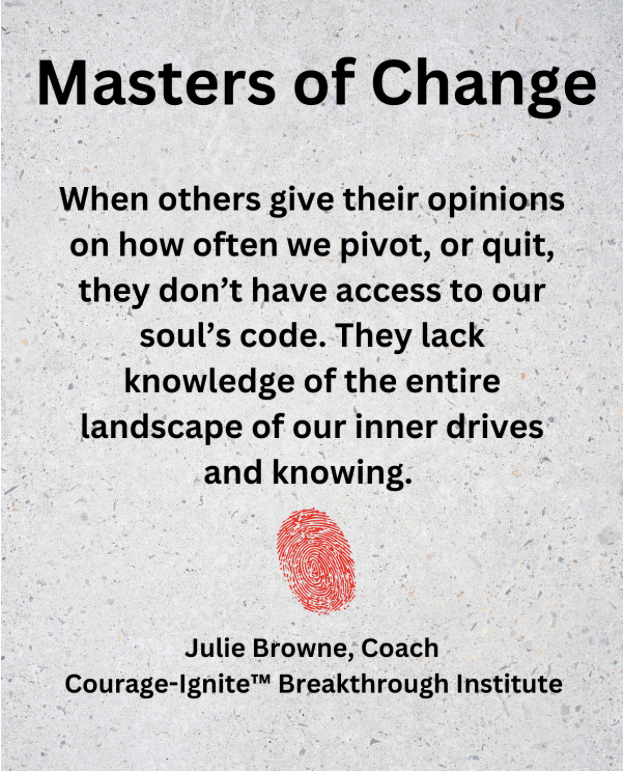
Even a good psychotherapist only has a small constellation of “facts” about us, the general truths and trends of everyday life and how we might best fit it all together. But their perspective is highly limited.
Persistence is an invisible force within us that others may or may not recognize.
And it’s always ours to own and leverage.
It’s connected to our need to create sovereignty.
Having clarity of purpose is also ours to develop, through leveraging our personal agency.
And these invisible forces are what’s needed to achieve hard things.
- If we take ourselves more seriously, and others’ ideas about what decisions to make with a grain of salt, we’ll be much happier with our journey.
Over time, we’ll learn to love, accept, and respect our intuition, our soul’s whispers.
And we’ll get confirmation from retrospect faster, because more often we’re making choices in alignment with our best self.
- Our life journey is designed to be as unique as our fingerprints and it’s...
Healing grief doesn't mean forgetting
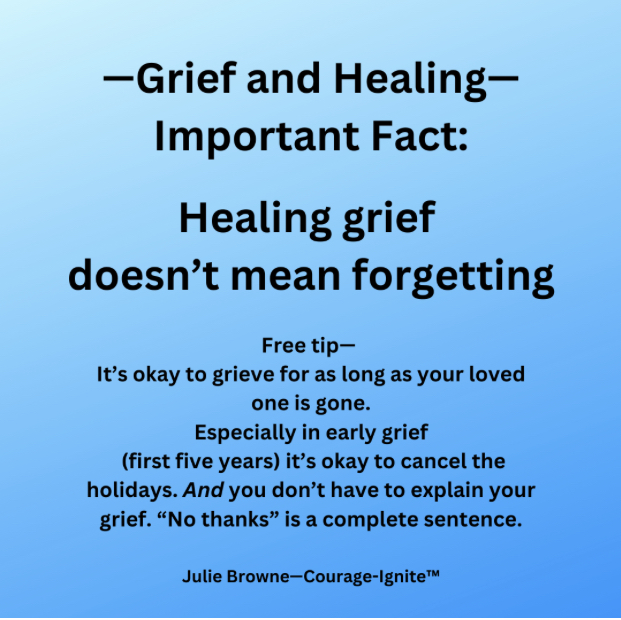
Who do you know needs this validation?
It's okay that it still hurts
and it's okay to not act like it doesn't.
--Julie

